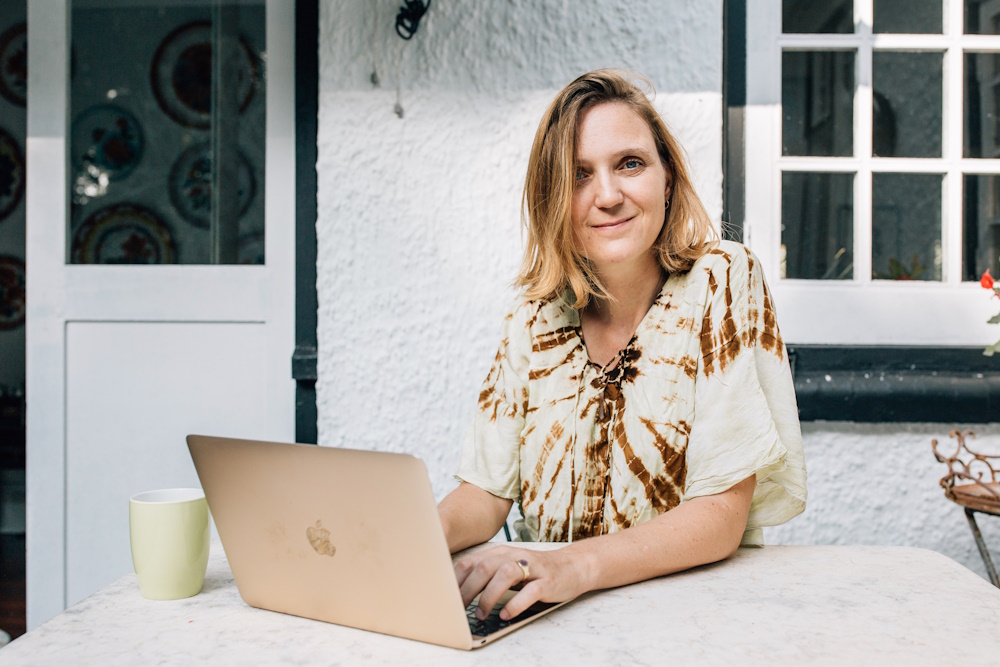After a childhood spent moving around Asia, the Middle East and Europe, Karien van Ditzhuijzen moved to Singapore in 2012. She has a degree in Chemical Engineering but gave up her career developing ice cream recipes to become a writer. In 2013, Karien joined the Singaporean charity HOME to support domestic workers staying at their shelter and, in 2014, founded the MyVoice blog, a place for migrant workers to share their stories.
She created and edited the book Our Homes, Our Stories, an anthology of 28 real-life stories written by migrant domestic workers. Her work and the women she met at HOME inspired Karien’s debut novel, A Yellow House. Her second novel, The Black and White House, was inspired by her own colonial house and its intriguing history.
After the interview, check out Karien’s blog, Bedouin Mama, and follow her on Facebook.

About Karien
Q: Where are you originally from?
A: The Netherlands
Q: What country and city did you move to?
A: Singapore
Q: When did you move?
A: 2012
Q: Is this your first expat experience?
A: No, I was born into expat life
Q: Did you move here alone or with a spouse/partner or family?
A: Yes, with my husband and three children
Q: Reason for moving?
A: Adventure, homesick for Asia. Work.
Living in Singapore
Q: What do you enjoy most about Singapore and Singapore in general?
A: Singapore is a melting pot of cultures and amazingly diverse. It is quite small, but at the same time, you have all of South East Asia on your doorstep.
Singapore is a great place to live with children as it is safe and has amazing schools. But if you scratch a little of its gleaming surface, you’ll find it is indeed, at its core, an Asian city with a fascinating heritage.
Q: Have you had any low points? What do you miss most about the Netherlands?
A: Nothing. We tried moving away but ended up coming back.
Q: What misconceptions about Singapore, if any, have you learned were not true?
A: Some people think Singapore is sterile and boring. These are typically people who only passed through for a day or so. Singapore is like an onion; it has many layers, but it takes time to peel them back and get to know the city in all its dimensions.
Q: Did you experience culture shock at all?
A: Not really, as I had lived in this region before.
Q: What are your favourite things to do on the weekend? Any particular places or experiences you’d recommend to fellow expats?
A: I love nature, and for a city-state, Singapore is amazingly green. It is known as the ‘City in a Garden’. There are many fabulous nature reserves which feature jungle trails. Otherwise, the Botanic Gardens offer a more cultivated experience of greenery.
Q: What’s the cost of living in Singapore compared to the Netherlands? Are there specific things that are especially expensive or cheap there?
A: The one problem with Singapore is the cost of living. Rent is very, very high, and international schools too are very expensive, so be sure to have the right salary before moving here. Food can be cheap or expensive, depending on whether you stick to local food or have a taste for imported goodies (cheese is $$$).
Q: What’s public transport like in Singapore and across Singapore?
A: Public transport and taxis are cheap, which counters the fact that cars are exorbitantly expensive. It’s a city-state, so it's very easy to navigate.
Q: What do you think of the healthcare available in Singapore? What should expats expect from local doctors and hospitals?
A: Healthcare is great, but does not come cheap.
Q: What’s the standard of housing like in Singapore? What different options are available?
A: As it is densely populated, many people live in high-rise buildings. There are, however, options for landed properties as well.
Q: Are there any areas or suburbs you’d recommend for expats to live in?
A: Anywhere! Every area has pros and cons, and it's a small country, so take your pick.
Meeting people and making friends in Singapore, Singapore
Q: Was meeting people and making friends in Singapore easy? How did you go about meeting new people?
A: When we first moved here, I met many people through my kid's school. Later, I made friends by volunteering at a local charity and through work. I am a fiction writer, and joining a writers' group has put me in touch with many other authors.
Q: Have you made friends with locals, or do you mix mainly with other expats? What advice would you give to new expats looking to make friends with the locals?
A: I have both local and expat friends. The best way to make local friends is through a common interest. Either work, volunteering, or joining a ‘hobby’ group like a book club or walking club.
Working in Singapore
Q: How easy or difficult was getting a work permit or visa? Did you tackle the visa process yourself, or did you enlist the services of an immigration consultant?
A: My husband has a job here, and my visa is linked to his. You need to find a job before you can get a visa. The company then organises the visa.
Q: How does the work culture in Singapore differ from the Netherlands?
A: It’s Asia. People often work late, but also start quite late.
Family and children in Singapore, Singapore
Q: How has your partner adjusted to your new home?
A: We all really like it here.
Q: Did your children settle in easily? What were their biggest challenges during the move?
A: They grew up here, we left for a little and then came back. Changing schools is always a challenge for children.
Q: What are your favourite family attractions and activities in Singapore?
A: For young children, the Zoo is great.
Q: What are the schools in Singapore like? Any particular suggestions?
A: International schools are many, they are all slightly different, and which suits you depends on your child. Local schools are hard to get into as a foreigner. The national curriculum is quite traditional and competitive.
Final thoughts
Q: Any advice you’d like to offer to new arrivals in Singapore?
A: Go out, explore! Meet people and see places.
►Interviewed on 4 October 2024



